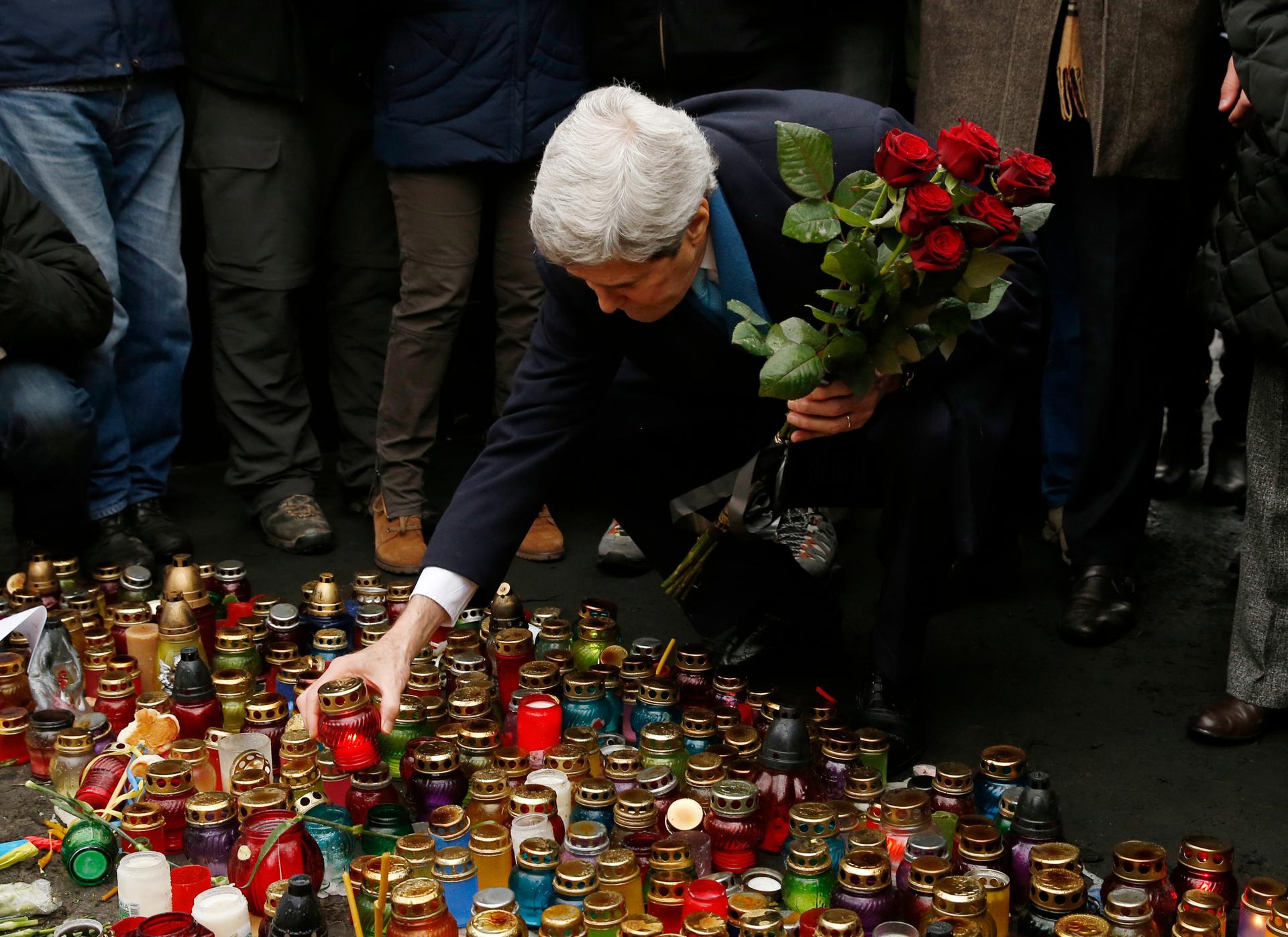Here’s a look at how the White House and the Kremlin view Ukraine differently
US Secretary of State John Kerry places a candle and roses atop the Shrine of the Fallen in Kiev, Ukraine March 4, 2014.
Moscow and Washington see recent events in Ukraine from strikingly distinct perspectives.
Russia has a right to protect its interests and those of Russian-speakers in Crimea and elsewhere in Ukraine, says Andranik Migranyan, who directs the Institute for Democracy and Cooperation in New York, a non-governmental organization with close ties to Russia's leadership.
"There is no invasion and this is the reality. According to a treaty between Ukraine and Russia, Russia has a legitimate right to have up to 25,000 troops [in Ukraine], and now Russia has a little more than 10,000," he says.
Migranyan's Russian-funded think-tank has close ties to the Kremlin. Kremlin officials haven't ruled out a military invasion of Ukraine.
"If [President Putin] asked the upper house of Russian parliament to give him this authority, it means that this is not just empty words, this is a reality," Migranyan says. "One thing is to have the right to do something, and another is to implement this right. If nothing threatens the life and security of Russian citizens and Russian-speakers, there is no need for use of force."
Migranyan says President Putin is in a starkly different position today than Russia was in the 1990s.
"Russia is not in shambles. Russia doesn't have a president always drunken and hanging around begging for financial and political support. Not all roads now go to Washington or Brussels. There are other roads going to Beijing, to Delhi, to other places, and the world is becoming different," he says.
Migranyan admits he's worried about Ukraine's future, but he resolutely defends Putin's actions.
"Every president who would like to be respected would act in a way how Putin is acting at this moment, very responsible, but very resolute and very determined to act if there is a threat for Russian citizens and their security," Migranyan says.
That's not, however, the way the US and European countries view the situation in Ukraine.
US Secretary John Kerry was in Kiev Tuesday with a clear message for Russia.
"If you [Russia] are legitimately worried about some of your citizens, then go to the government … go to the UN, raise the issue in the Security Council," Kerry said in a press conference. "I come here at the instruction of President Obama to make it absolutely clear that the United States would prefer to see this de-escalated."
Kerry also visited a memorial set up to honor protesters who died during the recent clashes.
"I wish you well. We will help you. The United States will help you," he said to the crowd that had gathered at Kiev's Maidan square.
Kerry also brought offers of financial and technical help with him to Ukraine. Meeting with Ukraine's new prime minister, Arseniy Yatsenyuk, he promised $1 billion in loan guarantees. The BBC's David Stern in Kiev says the financial help is desperately needed.
"Ukraine, in addition to its numerous problems, is also facing an economic crisis. They're facing default and they have a very large gas bill that they have to pay to the Russian gas monopoly, Gazprom," he adds.
But while the loan guarantees are good news for Ukrainians, he says, the protesters want to see more from the West than money.
"They are looking for something that will push Russia to make a decision to de-escalate, to stand down, but the big question is, what is that?" Stern says.
To some extent, American and European policy advisers aren't clear about how they can help Ukrainian protesters. At this point, Stern says, protesters hope the US and European countries will come up with creative ways to push Russia to leave Crimea.
